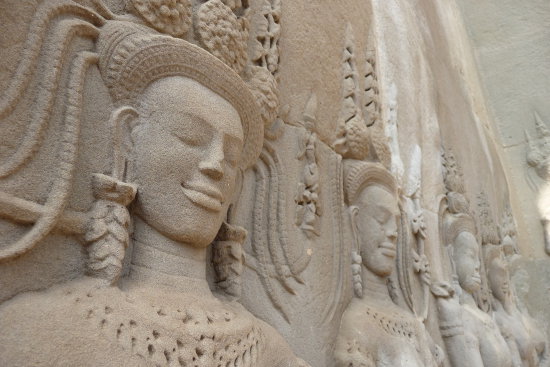
Photo: Sharon May, “Apsaras, Angkor Wat, Cambodia” (2009)
Queen Indradevi’s Sanskrit composition (c. 1190–1200 AD), inscribed on the large stele found at Phimeanakas in Siem Reap province, Cambodia, reveals a nearly flawless command of the language and its complex poetic forms. The poem was discovered in the stone rubble of the palace temple in 1916. The stele, believed to have been entirely covered in gold, comprises 102 stanzas; the final stanzas are included here. The inscription eulogizes her late sister, Jayarajadevi, the previous queen, as well as Jayavarman VII, to whom Indradevi herself would be married as chief queen after Jayarajadevi’s passing. All three figures were patrons of Mahayana Buddhism, the arts, and the monumental temples at Angkor and beyond.
Indradevi and her sister are believed to have been a great influence on the king, particularly in his unusual devotion to Buddhism. During his reign, Jayavarman VII built extensive hospitals, rest houses, and reservoirs, and many of Cambodia’s most beautiful and iconic temples: Ta Prohm (of “Tomb Raider” and “Indiana Jones” fame), to honor his mother; Preah Khan, to honor of his father; Neak Pean (“Coiled Serpent”), with its fountain and pools; and the Bayon, with its magnificent towers of faces looking out in four directions, at the center of the city of Angkor Thom. These places, and the great lake of the Tonle Sap, on whose edges the Angkor complex was built, are often referenced by Cambodian writers, both classical and contemporary, including many of the authors presented in this issue of Cambodian writing. Indradevi’s words are brought to life in this issue by translator Trent Walker, who chants the queen’s Sanskrit in Khmer style.
In the city named the Temple of Patience,
in the city of Former Eloquence, and eventually
in the city of Angkor, this brahmin girl of royal rank
became the beloved of King Jayavarman.
Her lowered head on the raised feet of the king,
she approached the Ganges, whose fallen feet lay on Shiva’s head.
Among the lovelies who loved learning, she scattered the king’s favors,
lovely nectars in the form of learning.
Wise by nature, a polymath, perfectly pure,
devoted to King Jayavarman,
having composed this pure paean
at the expense of all other arts, she gleamed.
Translation © 2015 by Trent Walker. All rights reserved.








